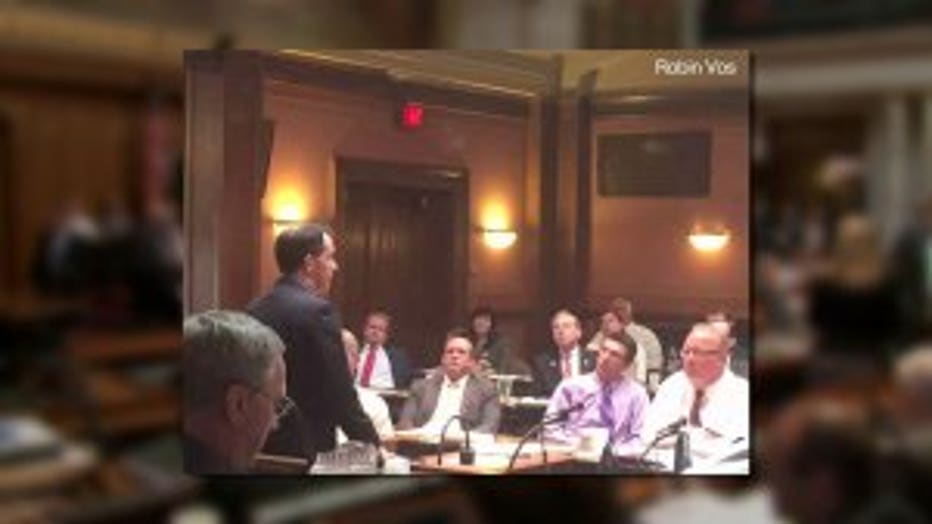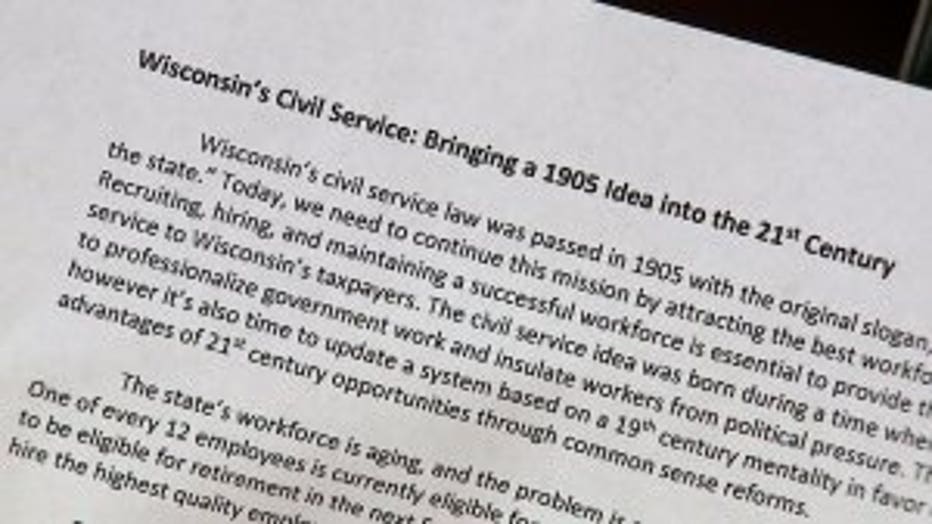Lawmakers: state employee viewing porn at work shows civil service law needs fixing
MADISON -- Republicans used a decade-old example of a state employee who couldn't be fired despite watching pornography at work to call for changes to Wisconsin's civil service law.
Gov. Scott Walker endorsed the plan, marking his first major stand since quitting the presidential race Monday. The move quickly put him at odds with state workers, who fear that GOP lawmakers will gut century-old workplace protections.

Governor Scott Walker meets with lawmakers
On Thursday in Madison, Assembly Republican lawmakers met with Walker in a caucus meeting, then made their plans public -- along with a handful of anecdotes of state workers behaving badly.
"He was viewing pornography 4.2 hours a day! They tried to get rid of him, but the work commission sent it back and said, 'no -- you didn`t tell him ahead of time that this was behavior that was frowned upon,'" Senator Roger Roth (R-Appleton) said.
A reporter for the Milwaukee Journal-Sentinel tweeted a link to an article describing the case, which played out during the mid-2000s.
Republican lawmakers want to make it easier for the state to fire bad workers by defining "just cause" that agencies must provide.
"Of course (the person that viewed porn) should be fired. But that`s the red herring. We`ll see what the bill really says when it`s finally introduced," Assembly Minority Leader Peter Barca (D-Kenosha) said.

Wisconsin civil service law
Democrats seized on the uncertainty created because the bill hasn't been introduced, so the details aren't public.
During the battle over Act 10, Walker said public employees would still be protected by civil service laws, if not their unions.
"We understand the governor`s back in the building, and up to his old tricks," Barca said.
Republicans pledge they're not taking protections away from the 30,000 civil service workers in state government.
"If you`re in a cubicle and you have a picture of a blue fist hanging up, you`re not going to get fired. If you did or did not sign a recall petition, you`re not going to lose your job," Senator Roth said.
Republicans would also get rid of the current civil service test, which is supposed to be a blind hiring process but one that GOP lawmakers say is vulnerable to people "gaming the test." They said a fry cook once aced an exam for a job in finance.
Republicans expect to replace the current test with a resume-based system for hiring.
They would require agencies to make hiring decisions within 60 days -- right now, they say some government managers take months to hire positions. They would also lengthen the probation period for new employees to two years.
Republicans say they`re going to introduce this bill Monday. They could hold a vote on it in October.
Governor Scott Walker issued this statement Thursday:
“Wisconsin needs to be able to compete for the best and the brightest employees in today’s modern workforce. This legislation will implement common-sense reforms to our recruiting process to get the best in the door and will give state agencies the tools to retain their great employees, as well as to address the bad actors who abuse the system.
Through these reforms, we will be able to ensure state government is providing the highest quality services to our citizens. I appreciate the hard work of Senator Roth and Representative Steineke in developing these thoughtful recruiting and retention reforms.
Agencies frequently experience issues as they work to quickly hire or identify the best person for the job, retain and reward top employees, or try to discipline the few bad actors who are taking advantage of the system.
Here are just a few issues state agencies have encountered within the current civil service system:
- One of every 12 employees is currently eligible for retirement, 23 percent of state workers are set to be retirement eligible in the next five years, and 40 percent of state employees will be retirement eligible in the next 10 years. Meanwhile, the recruitment process can take months because of nonsensical standards developed decades ago.
- The current exam process put forward a short order cook as the top candidate for a financial examiner position, which requires accounting and finance skills, at the Department of Financial Institutions.
- Many agencies have identified their top candidate for a job after months-long recruitment processes only to find out that the best qualified person took another job in the private sector or elsewhere because the state hiring process took too long.
- A current archaic law on the books related to “Job Abandonment” does not allow state agencies to remove employees who do not show up for work, even if they do not give notice that they will not be at work, until they do not show up without notice for five consecutive days.
- At the Department of Revenue, a state employee, who came under criminal investigation and was ultimately charged with theft, fled to Canada, and the agency was not able to fire this employee until after he had abandoned his job for more than five consecutive days.
- Recognizing the high quality work product of state agencies’ top performers is an important management tool, which is why Governor Walker and the Legislature created the discretionary merit compensation awards (DMC) in 2011. This tool allows managers to reward stellar job performance. Currently, DMCs are awarded from individual agency budgets.
- The legislation introduced by Senator Roth and Representative Steineke will create a designated fund for discretionary merit compensation awards to ensure that top performers and excellent work are recognized and rewarded.
- The Department of Natural Resources was ultimately prohibited from firing an employee who spent thousands of hours watching pornography. The employee had their job restored because they were not “sufficiently” warned and the agency should have taken steps to accommodate their addiction.

